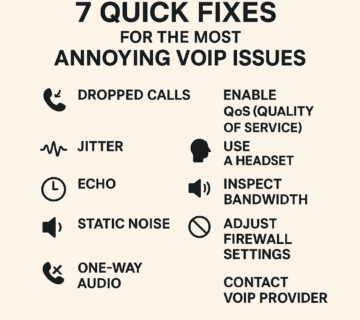How VoIP Can Streamline Your Business Processes & Boost Efficiency

VoIP is more than just a modern replacement for traditional phones—it’s a versatile communication system that helps streamline business processes, reduce costs, and ultimately boost efficiency. This article delves into how VoIP, including business VoIP systems, can empower your company, highlighting its various benefits and capabilities.
1. Introduction to VoIP and Its Business Benefits
Voice over Internet Protocol, or VoIP, is a technology that allows voice communication over internet connections rather than traditional telephone lines. Unlike conventional phone systems, which rely on circuit-switched networks, VoIP converts audio signals into digital data packets. This technology has transformed business communication, providing flexibility, enhanced capabilities, and significant cost savings.
The major business benefits of VoIP include lower communication expenses, integrated communication features like video calls and messaging, and scalability, which makes it perfect for growing enterprises. Business VoIP systems come equipped with features that enhance the communication process while allowing companies to operate more efficiently with fewer costs and complications.
2. Understanding How VoIP Works
To understand the potential of VoIP, it’s essential to know how it works. At its core, VoIP utilizes an internet connection to transmit voice data instead of a traditional analog phone line. The process involves converting voice signals into digital packets, which are then sent across an IP network—like the internet or a private local area network (LAN).
VoIP systems can be cloud-hosted, meaning they’re managed by a third-party provider, or they can be on-premises, where businesses handle the setup themselves. Business VoIP systems often prove advantageous for enterprises looking for minimal upkeep and scalability. VoIP offers clearer voice quality compared to older telephone systems, assuming a stable internet connection, which directly influences its efficiency and reliability.
3. Cost-Effectiveness of VoIP for Businesses
One of the most apparent advantages of VoIP is its cost-effectiveness. By shifting communication to internet-based systems, businesses can significantly cut down on traditional telephony expenses, including local and international calls. Traditional phone systems typically involve high costs for maintenance, infrastructure, and installation. In contrast, business VoIP systems use existing internet connections, which minimizes infrastructure costs.
For example, a small business that primarily communicates with international clients might find its phone bill cut by as much as 60% after switching to VoIP. Additionally, many VoIP services come with bundled features like conferencing, messaging, and video calls—all without extra charges.
4. Improved Collaboration and Team Communication
VoIP excels in improving collaboration, especially for businesses that rely on teamwork and cross-department communication. With features like video conferencing, instant messaging, and screen sharing, VoIP enables teams to communicate more effectively than they could with traditional phones.
The integration of VoIP with popular collaborative tools such as Microsoft Teams or Slack is another strong point. Team members can initiate a call or video meeting directly from their collaboration platform without needing to switch to another device or application. This capability is particularly useful for remote workers who need to maintain regular contact with their teams. IT support VoIP solutions can enhance this integration by ensuring robust, reliable communication systems that minimize downtimes.
5. Mobility and Flexibility with VoIP
Modern businesses require a high degree of flexibility, especially in a landscape where remote work is becoming the norm. VoIP provides unparalleled mobility, allowing employees to access their work phone line from virtually anywhere. With mobile apps for smartphones and tablets, business VoIP systems ensure that employees stay connected regardless of their location, boosting productivity for on-the-go workers.
For instance, salespeople can take client calls while traveling without incurring additional roaming charges, as all they need is a stable internet connection. Moreover, VoIP allows seamless switching between different devices—laptop, tablet, or phone—ensuring continuous access to communication tools.
6. Scalability of VoIP Systems
Businesses grow, and with growth comes the need for more communication resources. VoIP systems are inherently scalable, allowing companies to add or remove lines with ease as the workforce changes. This flexibility contrasts starkly with traditional phone systems, where adding new lines can mean significant installation work and increased costs.
Scalability is essential for growing enterprises that might see rapid changes in team size, such as startups or seasonal businesses. With business VoIP systems, scaling up (or down) is as simple as contacting the provider to modify the subscription, which saves time and money.
7. VoIP Integration with CRM and Other Software
A key advantage of VoIP lies in its ability to integrate with existing software tools like Customer Relationship Management (CRM) systems. When integrated with CRMs, VoIP can bring tremendous efficiencies, particularly for sales and customer service teams. For example, customer calls can be automatically logged into the CRM system, and representatives can initiate calls directly from the CRM dashboard, enhancing the efficiency of customer interactions.
This kind of integration allows businesses to streamline tasks, reduce administrative work, and ensure that customer data is easily accessible. IT support VoIP services can assist in integrating these systems smoothly, ensuring that VoIP works seamlessly with CRM tools and other business applications. This ultimately supports better customer relationships and more effective service delivery.
8. Enhanced Customer Service Experience
VoIP can significantly enhance the customer service experience. With features like call forwarding, automated attendants, and intelligent call routing, business VoIP systems ensure customers are quickly connected to the right department or person. This shortens wait times and enhances the general clientele experience.
For example, intelligent call routing can automatically identify high-priority customers based on their phone number or account data and route them to a specialized service agent. Such personalization capabilities contribute to higher satisfaction rates and stronger customer loyalty.
9. Business Continuity and Disaster Recovery
One of the often-overlooked benefits of VoIP is its role in business continuity and disaster recovery. Since business VoIP systems are often cloud-based, they provide built-in redundancy that ensures your business can continue communication during emergencies. If the office phone system is down due to a local outage, employees can still make and receive calls from their mobile devices or other locations.
Moreover, VoIP provides backup options like call forwarding to mobile phones, ensuring that customers can reach your business even during major disruptions. This resiliency is crucial in maintaining business operations and reputation during unforeseen circumstances.
10. VoIP Security: Addressing Concerns
VoIP security has evolved significantly over the years, making it a secure option for business communication. Modern business VoIP systems incorporate encryption protocols to protect voice data during transmission, minimizing the risks of eavesdropping or data breaches.
Businesses can further protect their VoIP systems through strong firewalls, secure passwords, and two-factor authentication (2FA) for user access. IT support VoIP services are instrumental in implementing these security measures effectively, ensuring a reliable and secure VoIP infrastructure that prevents unauthorized access and maintains the integrity of company communications.
11. Advanced Features of VoIP That Drive Efficiency
VoIP isn’t just a replacement for traditional phones; it comes with advanced features that can drive significant efficiency improvements. One such feature is voicemail transcription, which converts voicemails into text that can be read via email. This feature saves time and ensures that important messages are not missed.
Auto-attendants, call forwarding, and conference bridging are other VoIP features that enhance workflow efficiency. Additionally, analytics tools within many business VoIP systems allow managers to monitor call volumes, response times, and other metrics, providing valuable insights into communication patterns and areas for improvement.
12. VoIP’s Role in Reducing Operational Downtime
Traditional phone systems are prone to service disruptions due to physical damage, line issues, or maintenance needs. VoIP, on the other hand, has a much faster setup and is easier to maintain, which significantly reduces downtime. Since most business VoIP systems are cloud-managed, updates and maintenance are handled remotely by the provider without the need for onsite technicians, ensuring minimal disruption.
IT support VoIP plays a critical role here by monitoring and ensuring the uptime of VoIP services, minimizing interruptions, and providing technical assistance when needed.
13. Environmental and Sustainability Benefits
VoIP also contributes positively to environmental sustainability. Traditional telephony requires extensive physical infrastructure, including copper wires and switchboards, which has a significant environmental footprint. By contrast, business VoIP systems operate over the existing internet infrastructure, which leads to reduced physical waste.
Additionally, because VoIP enables remote working more effectively, it helps decrease the need for commuting, thereby reducing the overall carbon footprint of a business. This sustainability angle is increasingly important for companies looking to align with corporate social responsibility goals.
14. Real-World Case Studies
Real-life examples demonstrate how VoIP can revolutionize business processes. For instance, a healthcare provider that transitioned to VoIP was able to reduce call handling time by 30%, leading to more efficient patient communication. In the retail sector, a company managed to reduce their overall communication costs by half while providing better customer service through features like automatic call routing and customer data integration.
Frequently Asked Questions About VoIP
1. What is VoIP and how does it work for businesses?
VoIP, or Voice over Internet Protocol, is a technology that allows you to make voice calls using an internet connection rather than a traditional analog phone line. For businesses, this means voice data is converted into digital signals, transmitted over the internet, and then converted back at the other end for communication. It allows businesses to reduce costs, improve mobility, and benefit from features like call forwarding, conferencing, and integration with other communication tools.
2. How can VoIP help in reducing business communication costs?
VoIP can significantly reduce business communication costs by using existing internet infrastructure instead of requiring dedicated phone lines. International and long-distance calls are much cheaper or even free in some cases. Moreover, with VoIP, businesses do not need to invest in extensive hardware and maintenance costs, as these services are often managed by the provider.
3. Is VoIP suitable for remote work and distributed teams?
Absolutely. VoIP is highly suitable for remote work and distributed teams. It enables seamless connectivity from anywhere as long as there is internet access. Employees can use VoIP mobile apps or connect through laptops and other devices, making it ideal for telecommuters and remote employees who need to stay in touch with the rest of their team.
4. What advanced features of VoIP contribute to business efficiency?
VoIP comes with a variety of advanced features that enhance business efficiency, including:
- Auto-attendants that route calls to the right department without a receptionist.
- Voicemail-to-email transcription, which allows employees to receive voice messages as text.
- Video conferencing and screen sharing, enabling real-time collaboration.
- Call forwarding and intelligent call routing, which ensure that important calls are not missed. These features streamline communication, save time, and make work processes more effective.
5. How secure is VoIP compared to traditional phone systems?
Strong security features like firewalls, encryption, and secure authentication protocols are built into the architecture of contemporary commercial VoIP systems. Encryption ensures that voice data cannot be intercepted by unauthorized parties, making VoIP a secure option for business communication. IT support VoIP services are crucial in setting up these security features effectively, ensuring the protection of sensitive business communications.
6. Can VoIP integrate with existing business software like CRM?
Yes, VoIP can easily integrate with Customer Relationship Management (CRM) systems and other business software. This integration allows for efficient call handling, as employees can initiate calls directly from the CRM dashboard, and customer call data can be automatically logged. This functionality is especially useful for sales and customer service teams, helping them improve productivity and keep track of customer interactions in one centralized system.
7. What are the key challenges of implementing VoIP in a business?
Some challenges of implementing VoIP include:
- Dependence on internet quality: A strong and stable internet connection is crucial for high-quality calls. Poor internet can lead to dropped calls or poor audio quality.
- Security concerns: VoIP calls are subject to the same internet security issues as other digital communications, but this can be mitigated through strong encryption and secure network practices.
- Transition period: Moving from a traditional phone system to VoIP can require adjustments, including employee training and updating some business processes.
8. Is VoIP scalable for a growing business?
Yes, scalability is one of VoIP’s most significant advantages. Unlike traditional phone systems, where adding lines requires new hardware, business VoIP systems allow you to easily add or remove lines as your business needs change. This makes VoIP a great choice for businesses expecting growth or those with fluctuating communication needs.
9. How can VoIP enhance the customer service experience?
VoIP enhances customer service by offering features such as intelligent call routing, call recording, and auto-attendants. These features help customers get faster responses and be directed to the appropriate team without waiting unnecessarily. Additionally, integrating VoIP with CRM systems means that customer information can be displayed to agents during a call, which allows for personalized and efficient customer interactions.
10. What are the setup requirements for a business VoIP system?
Setting up a business VoIP system requires:
- A high-speed internet connection with sufficient bandwidth.
- VoIP phones or softphone applications installed on devices such as computers or smartphones.
- A subscription with a reliable VoIP service provider.
- (Optional) Additional equipment like routers or VoIP adapters, depending on the specific setup chosen. The simplicity of setup is one reason why business VoIP systems are growing in popularity among businesses, as they don’t require extensive physical infrastructure compared to traditional phone systems.
11. How does VoIP contribute to better business continuity?
VoIP helps maintain business continuity by allowing employees to access the system from anywhere, ensuring communication is not interrupted during power outages or local disruptions. Because many business VoIP systems are cloud-based, they are less prone to physical damage, meaning employees can continue to make and receive calls even if traditional systems fail.
Conclusion: The Future of VoIP in Business Efficiency
VoIP represents a leap forward in business communication, offering substantial improvements in cost, scalability, efficiency, and customer service. With advanced features, easy integration, and impressive flexibility, it aligns perfectly with the evolving needs of modern workplaces. As businesses continue to adapt to remote work and digital transformation, VoIP is not just a communication tool—it’s a strategic asset that can help companies stay agile, connected, and efficient.




No comment